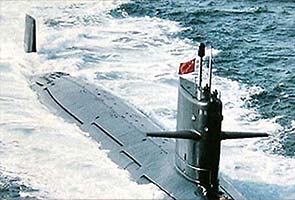
New Delhi, August 8: The INS Arihant, India's indigenously-built nuclear-powered submarine which is capable of carrying nuclear missiles "will be going for sea-trials soon," Chief of Naval Staff, Admiral Nirmal Verma told reporters today in New Delhi.
The submarine is now the in last stage of testing. Sources have told NDTV that barring any major set-backs, the INS Arihant should be able join the Indian Navy within the "next 18 months".
The advent of INS Arihant into the fleet will complete the crucial link in India's nuclear triad - the ability to fire nuclear weapons from land, air and sea. Admiral Verma, however, refused to give details of the weapons package on board the nuclear submarine. "I will not want to get into the details" he said.
The sea-trial of the INS Arihant was scheduled to start last year but was delayed because of technical glitches.
The Defence Research and Development Organization (DRDO) announced last month that it has successfully developed nuclear-tipped submarine-launched ballistic missiles (SLBMs). Long shrouded in secrecy, unlike surface-to-surface nuclear missiles like Agni, the SLBM was a closely -guarded secret while in development and was called the 'Sagarika Project'. In all probability, the INS Arihant will take this missile on board. So far, countries like the US, Russia, France, China and the UK have the capability to launch a submarine-based ballistic missile.
Although INS Arihant signifies a huge jump for the Indian Navy, the good news ends here. India's fleet of conventional submarines is fast depleting. India has 14 conventional submarines that run on either battery or diesel and are aging and outdated. Each of them will have completed the standard life-span of 25 years by 2017.
Admiral Verma admitted concern over the fact that upgraded versions have been grounded by bureaucratic delays.
At any given time, only seven submarines are available for deployment and are split on either coast. Seven submarines are mostly unavailable because they need to be serviced, refitted at increasingly short terms. Also, because the boats are aging fast, their lifespan need to be extended and therefore they are not deployed.
The Indian Navy's 30-year submarine programme, devised in 1988, envisaged buying six submarines from the West and countries in the East like Russia. India was to use the acquisition process to gain enough knowledge to build the next 12 submarines on its own. But Indian shipyards have largely been unable to either pick up the requisite technology or capability. Shipyards like the Hindustan Shipyard Limited which was originally supposed to build at least 3 submarines have been found to be incapable of building submarines.
The Indian Navy has now approached the government to be allowed to build two submarines in the shipyard of the foreign collaborator. "It is not exactly asking for importing two submarines. We are asking the government to allow us to build two submarines in their shipyard. In the long run it will be help our technicians gain expertise" and cut down in delays when building in India, Admiral Verma said.





Comments
Add new comment